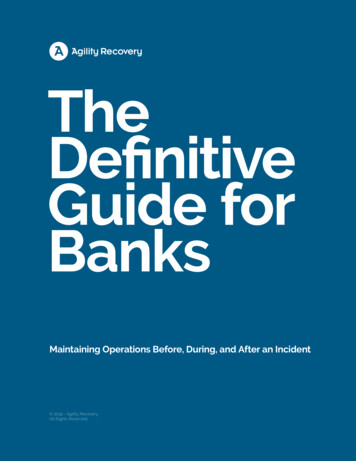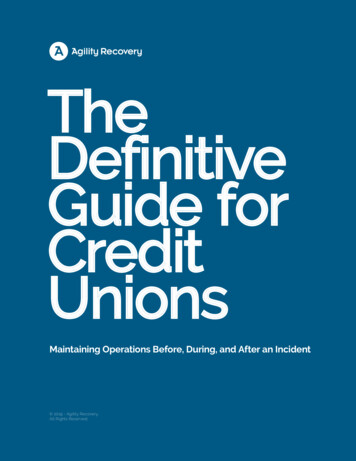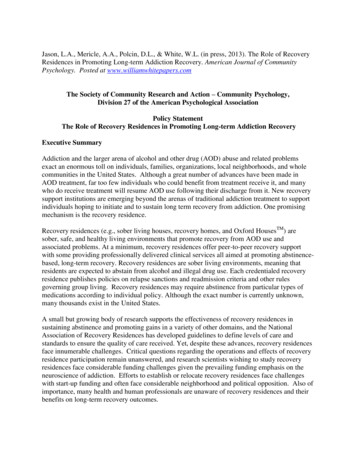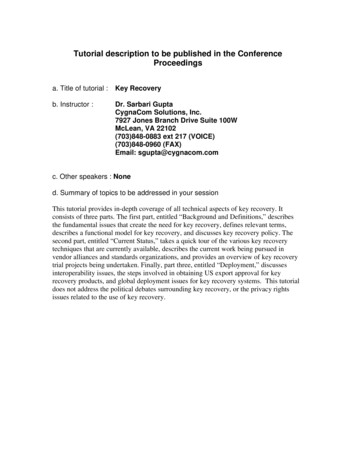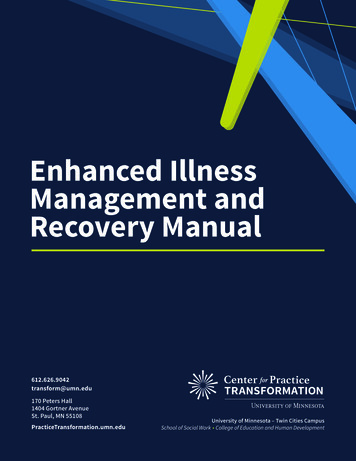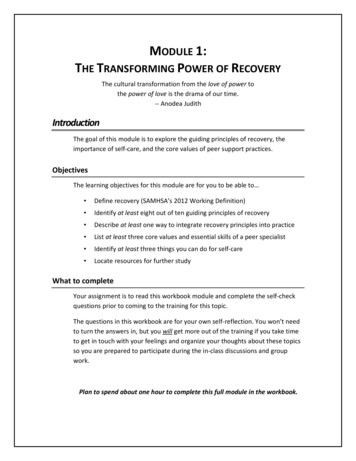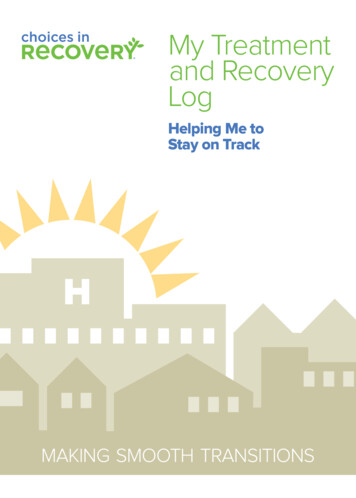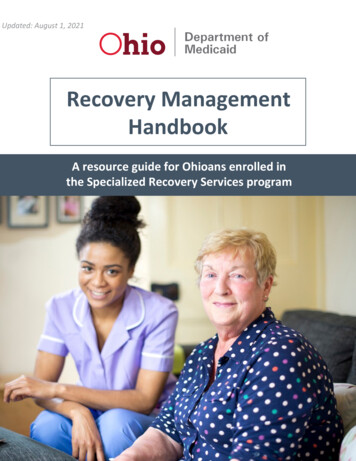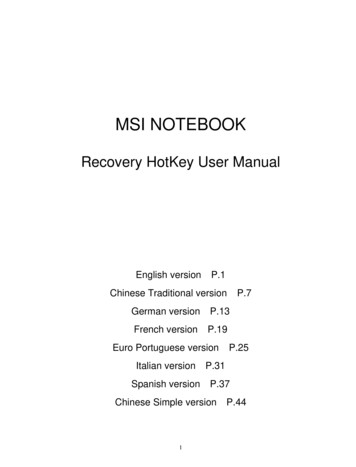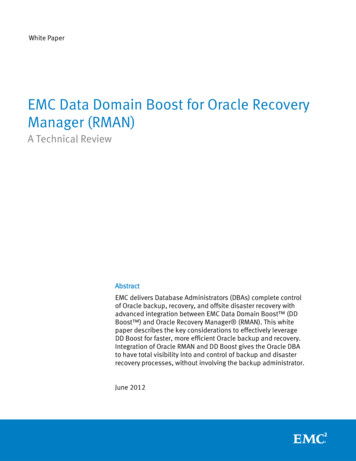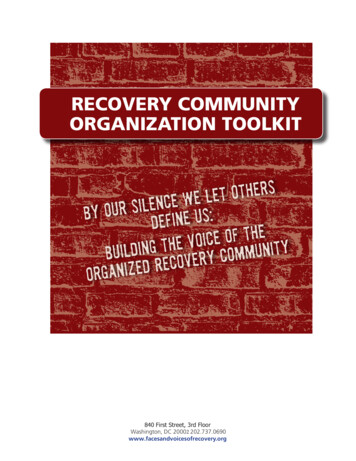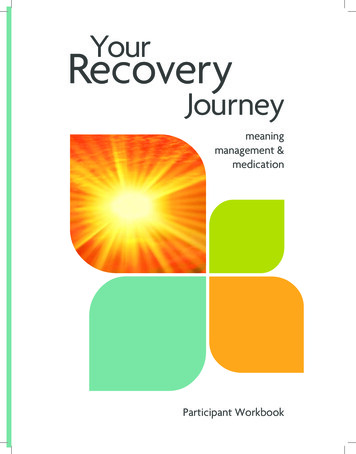
Transcription
YourRecoveryJourneymeaningmanagement &medicationParticipant Workbook
YourRecoveryJourneymeaningmanagement &medicationParticipant Workbook
Participant WorkbookYour Recovery Journey: Meaning, Management, and MedicationThe Schizophrenia Society of Canada is interested in hearing fromyou. If you find this resource helpful, or if you have any suggestionsor questions, please let us know.E-mail info@schizophrenia.ca or phone 1-800-263-5545The views herein do not necessarily reflect those of Janssen Inc.Copyright 2009 Schizophrenia Society of CanadaGraphic Design: Hansen DesignEditing: Edna BarkerVideo Production: Swim MediaPrinting: Generously donated by Janssen Inc.
Your Recovery Journey: meaning, management, & medicationContentsForeword5Introduction9Chapter 1:What is recovery?13Chapter 2:Quality of life23Chapter 3:Self-management33Chapter 4:Medication as a tool for recovery47Chapter 5:Moving forward: personal action planning73Sources88Appendix911
Participant WorkbookAcknowledgementsThis program is the result of a collaboration between the Schizophrenia Societyof Canada and Janssen Inc. and has been guided by an advisory committeecomprising consumers, family members, and service providers. We would like tothank the members of the advisory committee, as well as those who participated inthe video. This project would not have been possible without the support of ourfunder, Janssen Inc.Special thanks to:Amy Butcher (Manitoba), Dr. Sonia Chehil (Nova Scotia), Martine Elias (Ontario),Wendy Gerhart (Ontario), Mia Hill (Saskatchewan), Corey Maruca (BritishColumbia), Sherri Matsumoto (Manitoba), Isabelle-Anne Mimeault (Ontario),Ian Pollett (Newfoundland), Gerald Samson, Jean Samson (Ontario), Maritza Tello(Saskatchewan), Deborah Windell (Ontario).A special thank you to Bonnie Pape, whose wisdom and expertise guided thedevelopment of the project’s resources.To all of you, we express our sincere appreciation and gratitude.Pamela Forsythe, MN, FRCPCPresident, member of the advisory committeeChris Summerville, D. Min., CPRPChief Executive Officer, member of the advisory committeeCatherine Willinsky, MHSc.Manager, National Programs and Projects, member of the advisory committee2
Your Recovery Journey: meaning, management, & medication“Your Recovery Journey” is a valuable resourcefor those affected by mental illness who arelooking for hopeful tools to assist them in theirrecovery. Recovery is a practical concept. Itworks in real life, with real people. I know thisfrom first-hand experience.A member of my family suffered from severedepression. Following an attempted suicide, withprofessional and spiritual help and medication,my sister was able to recover sufficiently tograduate from university and enjoy a meaningfuland productive life for many years.The national mental health strategy, whichthe Mental Health Commission of Canada isdeveloping, will have as its cornerstone theprinciple of recovery.(Michael Kirby, Chair, Mental Health Commission of Canada)3
Participant Workbook“We all have something to recover from,whether it is mental illness, addiction,physical disability, loss of loved ones,victimization or loneliness Recoverycreates a community that all can take part inas it erases the distinctions of position, age,skin colour, religion, language and education,and joins us in our common humanity.”(Sowers, W. 2007)4
Your Recovery Journey: meaning, management, & medication ForewardForeword“Don’t tell me recovery is not evidence based! I am the evidence.”(Woman with a mental illness)I love this quote! While there is no one definition that all agree on, recovery is allabout hope, the hope that people can live lives of quality and dignity in spite of thelimitations that come with mental illness.For years it was thought that mental illnesses like schizophrenia were kiss-of-deathdiagnoses. Life was over. All hope evaporated. But we now have numerous long-termstudies that indicate that up to two-thirds of people with mental illness can anddo recover.Recovery can have many different meanings. Some people will have one episode ofpsychosis or schizophrenia. Their recovery is much like that of a person recovering froma heart attack; though they are vulnerable, they may never have another episode again.For others, the recovery or recovering process is much longer, perhaps even life-long.There may be intermittent relapses with mental illnesses like schizophrenia andbipolar disorder. Like people who live with asthma, people with schizophrenia canlive a life of quality and purpose, but must pay special attention to self-care and tomanaging their illness.Some people who have experienced unremitting mental illness seem to be beyondrecovery. I understand this: one of my brothers lives with schizophrenia and anotherwith bipolar disorder. Illness can be unremitting when people can’t access recoveryoriented mental health services and systems. But we must still hope they canexperience recovery.5
Participant Workbook ForewardDr. Larry Davidson, professor of psychiatry at Yale University, says that recoverymeans learning how to live outside the mental illness rather than inside it. To liveinside the mental illness is to be lost in its downward spiral. Living outsideschizophrenia is about reclaiming your life. It is about self-determination, choice,hope, and empowerment.Many who experience prolonged mental illness are not only recovering from themental illness, but are also recovering from the losses associated with mental illness,and from its stigma and discrimination: loss of friends, income, safe and affordablehousing, vocational and recreational opportunities, health, and hope of recovery.We need to address the social injustices and lack of full citizenship opportunitiesexperienced by people who live with mental illnesses.Experts who work with young people experiencing early psychosis have said thatrecovery can be seen from three dimensions: personal, social, and illness-related.(Windell, D., et al., 2008) Personal recovery is about acceptance and regaining purpose and meaning in lifeas you come to terms with mental illness Social recovery is about living a safe, full, and dignified life in the communitywith appropriate supports and services Illness recovery is self-management and using your own “personal medicine”(Deegan, P. 2005), for example stress management, support groups, meditation,or yoga, as well as pharmaceutical medicationIn the Participant Guide, we look at and discuss five topics. What is recovery?Quality of lifeSelf-managementMedication as a tool for recoveryMoving forward: personal action planningOne of the best remembered television series from the 1950s was a show calledThis Is Your Life, broadcast from 1952 to 1961. The program was based on a simpleprinciple: each guest was surprised with a presentation of his or her life.Well, this is your life. You didn’t ask for a mental illness. But a recovery journeyis part of your life, too. It’s a journey of meaning, management, and medication.We hope this resource helps you live life outside mental illness.People who have experienced mental illness tell us recovery is possible. They say life canbe lived beyond the illness.6
Your Recovery Journey: meaning, management, & medication ForewardThe motto of Home Depot is “You can do it. We can help.” The job of mental healthservice providers, family, and friends is to create environments in which recovery cantake place. Only you can do the work of recovery. But we can help.May this resource, Your Recovery Journey, inspire you; may your recovery be as mucha reality as your mental illness.I want to acknowledge the support of Janssen Inc. and our advisory board –consumers, family members, and service providers who assisted in the creation ofthis series. Our project coordinator, Catherine Willinsky, is to be congratulated andcomplimented on her leadership. She has kept us focused and on track with the project.Finally, be assured we have endeavoured to be faithful to the literature written aboutrecovery in the past twenty-five years.I know as a Board Member of the Mental Health Commission of Canada that theCommission is committed to the development of a recovery-oriented mental healthsystem in Canada. I trust that this program will contribute to the much-neededdiscussion in Canada about the recovery model.Well, this is your life. Your journey of recovery!Chris Summerville, D. Min., CPRPChief Executive Officer, member of the advisory committeeSchizophrenia Society of Canada7
Participant Workbook Foreward8
Your Recovery Journey: meaning, management, & medication IntroductionIntroduction9
Participant Workbook IntroductionIntroductionWhat’s this program about?Your Recovery Journey is based on the premise that there is hope, that people withmental illness can get well, stay well for long periods of time, doing the things they wantto do with their lives.The program is important for several reasons. It builds on the now well-establishedliterature and evidence base for recovery from mental illness, and contributes to thegrowing number of programs that focus on empowering people to manage their owntreatment and recovery journey.We have based the program on a peer-support model for a number of reasons:because peer support is an example of the kind of self-determination that occurs inrecovery, and because peer support can transform lives. Hearing from others whohave experienced similar struggles, and who understand how we are feeling, is animportant factor in recovery.The program is designed to be facilitated or co-facilitated by people who themselveshave experience with mental illness and have also experienced recovery in their ownlives. This “hope in action” approach is a fundamental principle of the program.What will you learn in the program?This program aims to increase your ability to meet your personal recovery goals. How?By: providing an opportunity to explore the many aspects of recovery exploring the role of personal goals in the recovery journey sharing knowledge and tools that will help you take responsibility for yourwellness and stability introducing a variety of self-help techniques so you can manage and reduce thesymptoms of your illness helping you reflect on and plan your recovery journey finding effective ways to reach out for and use the support of a network of familymembers, friends, and service providers10
Your Recovery Journey: meaning, management, & medication IntroductionWho is the program for?Although some of the examples in this workbook relate to schizophrenia, Your RecoveryJourney is intended to serve the needs of all people who have had experience with mentalillness, regardless of their diagnosis or the stage they are at in their recovery. There aresignificant differences in the symptoms, course of illness, and treatment of differentmental illnesses—but the recovery journey cuts across all of these. Almost everyone whois recovering from mental illness is striving to identify and reach personal goalsfind meaning and fulfillment in the face of a new realitydeal with the effects of stigmaestablish a positive sense of self and a sense of belongingmanage symptoms and medicationstay wellWhat’s this workbook about?If you’re reading the workbook, you’re probably a participant in the program. Theworkbook covers the topics that are introduced in the group sessions, but it’s yoursto keep, and it provides additional tools and information for you to work throughon your own.It’s best if you can work through the materials as you move through the program.During the week after a group session, you can reflect on what you learned anddiscussed in the group, read the information provided, and record your ideas,thoughts, and plans in these pages. Most important, you can use the workbook tochart your recovery journey.“Instead of looking at recovery as relapseprevention, I see it as an active process ofsetting goals and working towards them.”(Manschreck, T.C. et. al. 2008)11
Participant Workbook Introduction“Schizophrenia is not a hopeless disease. Many,many people who are diagnosed go on to live fulllives where they have a sense of happiness.”(Dr. Sonia Chehil)12
Your Recovery Journey: meaning, management, & medication Chapter 1Chapter 1:What is recovery?13
Participant Workbook Chapter 1Chapter 1:What is recovery?What have we learned about recovery so far?Here are some key points. Recovery is a process built on hope, choice, self-determination, andempowerment. People with mental illness are resilient and have expertise about their ownexperience of recovery. Recovery is possible for all people living with mental illness. Recovery is more than reducing symptoms. Recovery happens when people withmental illness set and achieve their life goals and ambitions. The goals and thejourney belong to you. People with mental illness must be encouraged and given the tools to direct theirown recovery. Taking responsibility for yourself and your own actions is part of recovery. So isseeking support from others. Recovery is a process that can involve many stages, with inevitable setbacks anduncertainty.Tools in this chapter➊➋➌➍14Defining your recoveryFinding hopeBuilding support systemsPersonal recovery strategies
Your Recovery Journey: meaning, management, & medication Chapter 1What does “recovery” mean?There is no one definition of recovery, because it means different things to differentpeople. Here are a few definitions people have found helpful.“Recovery is a way of living a satisfying, hopeful, and contributing life even with the limitations causedby illness. Recovery involves the development of new meaning and purpose in one’s life as one growsbeyond the catastrophic effects of mental illness.” (Anthony, W.A. 1993)“Recovery is a process, a way of life, an attitude, and a way of approaching the day’s challenges. It isnot a perfectly linear process. At times our course is erratic and we falter, slide back, regroup andstart again The need is to re-establish a new and valued sense of integrity and purpose within andbeyond the limits of the disability; the aspiration is to live, work, and love in a community in whichone makes a significant contribution.” (Deegan, P.E. 1988)“Recovery is a self-determined and holistic journey that people undertake to heal and grow.Recovery is facilitated by relationships and environments that provide hope, empowerment, choicesand opportunities that promote people reaching their full potential as individuals and communitymembers.” (Pennsylvania Office of Substance Abuse Mental Health Services. 2005)“Recovery is an uncharted, unpredictable and personal journey.” (Sheehan, A. 2002)What do these definitions have in common? They all emphasize a person’s capacity to have hope and lead a meaningful life demonstrate that there is hope for recovery for every person with a mental illness acknowledge that just as the course of illness varies greatly from person to person,everyone’s story and recovery are unique show that recovery is more than symptom management, and that personal recoverycan happen even if a person continues to experience symptoms of their illness15
Participant Workbook Chapter 1➊ Defining your recoveryOften one of the first tasks in the recovery journey is to think about what we’re recovering from – not only theeffects of illness, but losses, trauma, stigma, dealing with the mental health system, and a lack of enrichingopportunities as well. Some of our losses may include loss of power, loss of valued roles, loss of meaning and purpose, and loss of hope. What are the losses you have experienced as a result of your illness that you need to recover from? any people have said that stigma, discrimination, and negative attitudes towards mental illness can be moreMdifficult to deal with then the illness itself. How have you experienced stigma in your life? How have you dealt with it?16
Your Recovery Journey: meaning, management, & medication Chapter 1Mental health services and systems can devalue and disempower the people they are intended to serve. How did you experience the mental health services you received? What aspects of your experience do you need to recover from? What has helped you in your recovery journey? What has hindered your recovery journey?“The power of thehuman spirit tosustain grief and lossand renew itself withhope and couragedefies all description.”(Gottlieb, D. 1991)17
Participant Workbook Chapter 1“To hope under the mostextreme circumstances isan act of defiance thatpermits a person to livehis [her] life on his [her]own terms. It is part ofthe human spirit toendure and give a miraclea chance to happen.”(Groopman, J. 2003)➋ Finding hopeHope – a belief that we can get better – fuels the recovery process. Friends, family,and service providers can “hold the hope” for people who are ill in the early stagesof recovery. But at some point each person much develop and internalize his or herown sense of hope. (Davidson, L. 2003)Many people who have experienced recovery in their lives have said that the first stepon their journey was having a sense of hope. Feeling the first glimmers of hopecreates a source of energy that helps us move forward and see the possibilities ahead.We reclaim our identity as a whole, well individual and become self-directed. Webegin to understand our preferences. As we advocate for ourselves, we begin to playan active role in our lives and our treatment. We make the choice to recover.(Holder, J. 2007)Sharing hopeA helpful way to reinforce the hope we feel in our lives and to spread hope is to shareour own personal stories. By reflecting on a time when we were faced with challengesand overcame them, we remind ourselves of our own personal power and encourageothers that there is hope. (Holder, J. 2007)“To me recovery means freedom, hope.”(Maritza)18
Your Recovery Journey: meaning, management, & medication Chapter 1 What does “hope” mean to you? When did you first feel hope that recovery was possible? What can you do to increase your feelings of hope? What/who are your key sources of hope (friends, family, spirituality, meaningful activities)?19
Participant Workbook Chapter 1➌ Building support systemsSupport is an essential part of recovery, and having access to a wide range of supports is important in helping peoplecelebrate their successes and get back on their feet when they experience a setback.A support system is made up of people who care about you and spend time with you, listen to you and stand byyour side. They can be friends, family members, service providers, community members, co-workers, members ofpeer-support groups, faith communities, and others. Who are the key members of your support system? Where are some places in your community you could meet and get to know potential members of your support team? What kinds of services and supports have you found most helpful in your recovery journey? What other services and supports are you interested in finding out about?20
Your Recovery Journey: meaning, management, & medication Chapter 1➍ Personal recovery strategiesPat Deegan, an expert in the field of recovery and a person who has experiencedmental illness, has created the useful concept of “personal medicine” to describe thethings in people’s lives that help build self-esteem, empowerment, and confidence.In her own personal experiences as well as her research, Deegan found that there aremany ways to change our body’s biochemistry. This finding helped her come upwith the notion of “personal medicine.”Personal medicine is not about medications prescribed by a doctor. It is a strategyfor taking care of yourself that you can initiate yourself.Like pharmaceutical medications, personal medicine can help reduce and eveneliminate psychiatric symptoms. The goal of personal medicine is to improve mood,thinking, behaviour, and overall well-being.“Personal medicine’ refers to the things we do thatraise our self esteem and make life worth living.Fishing, meditating, exercising, having dinner with afriend, being a good mom – all of these things andmore can be vital to our recovery.”(Deegan, P. 2005)21
Participant Workbook Chapter 1What is your “personal medicine”? What do you do that helps comfort or soothe you? What kinds of activities challenge, and engage you? Are there things other than taking prescribed medication that you do to help reduce your symptoms? What other personal recovery strategies or activities have you found to be helpful?“Mental illness is just one part of me, like I like music andwriting poetry and I have family and friends, and all kindsof other things that make up me.”(Sherri)22
Your Recovery Journey: meaning, management, & medication Chapter 2Chapter 2:Quality of life23
Participant Workbook Chapter 2Chapter 2:Quality of LifeWhat have we learned about quality of life so far?Here are some key points. Having a positive quality of life is essential to recovery. The factors that contribute to quality of life are different for everyone, butusually include relationships with family and friends, work, housing, income,neighbourhood, community, health, education, and spirituality. Many people say that their personal tools for quality of life include anunderstanding of our personal mental health strengths and challenges; a positivesense of self, purpose, and meaning; a feeling of inclusion and belonging; and asense of personal control and empowerment. Identifying the activities, relationships, and roles that promote quality of life canhelp us reach our recovery goals.Tools in this chapter➊➋➌➍➎24Understanding your personal mental health strengths and challengesDeveloping a positive sense of selfFinding purpose and meaningHaving a sense of inclusion and belongingGaining personal empowerment and self-determination
Your Recovery Journey: meaning, management, & medication Chapter 2What is quality of life?In the first chapter we focused on recovery, what it means to us as individuals, and thethings that have helped us in our journey of recovery.In this chapter we are going to focus on the things that give our lives meaning, purpose,and “quality.” We’ll look at the things that support us and let us live a satisfying life.A lot of research has been done measuring the quality of life of people with mentalillness, but mostly from the service providers’ point of view. Increasingly, though, thereis an interest in looking at what quality of life means for people with mental illness, andhow it is connected to recovery.Many people with mental illness have described their basic mental health needs as“a home, a job, and a friend” or, as someone recently put it, “somewhere to live,something to do, and someone to love.” People say that a decent quality of life dependson having access to these basic things, which are important for everyone.“Quality of life means that you’re in a place where you feelreally good – about yourself, about what you’re doing, whoyou are, where you live.”(Corey)Knowing that we are valuable to ourselves and others, having a sense of why we are inthis world and what we are striving for, and feeling that we have a clear role and a placeto belong all contribute to our sense of control, our mental health, and quality of life.(Canadian Mental Health Association, 2004)Let’s take a closer look at the key components of quality of life, and what having apositive quality of life means to you.25
Participant Workbook Chapter 2➊ Understanding your personal mental health strengths andchallengesAs individuals, we all need to develop an understanding of our strengths and challenges. For people with mentalhealth problems, this can be a complex issue.We need to understand how the illness affects our thinking, feelings, and behaviour before we can begin to takeback control. The situation is even more complicated because we’re not just dealing with our own symptoms andexperiences, but also with the reactions of family, service providers, friends, and society.Many people see recovery as a meaningful opportunity for positive transformation; they feel they have become abetter person because of their illness experience, with an increased understanding of suffering and an expandedcapacity for empathy.The following questions look at how your experience has helped you develop an understanding of your personalmental health strengths and challenges. (There are more tools for understanding your mental health strengths andchallenges in Chapter Three.) What are the biggest personal challenges your illness has posed? Think about your personal strengths and gifts. What positive traits and personal strengths do you have?For example, self-awareness, persistence, integrity, and patience. How can you use your strengths to deal with the effects of the illness on your life?26
Your Recovery Journey: meaning, management, & medication Chapter 2➋ Developing a positive sense of selfA positive sense of self is a basic tool for dealing with mental illness and promoting our mental health.We need to be able to separate our illness from ourselves – the illness may be part of our life, but does notdefine who we are. How would you describe yourself as a person? Who are you other than your illness? How has your illness affected your sense of self? What has helped you put the illness in its place and develop a positive sense of self? How can you continue to nurture and develop a positive sense of self?“Recovery is abouthaving confidence andself-esteem. There arethings I’m good at,and I have somethingpositive to offer theworld.”(Mueser, K.T. et. al.2006)27
Participant Workbook Chapter 2❸ Finding purpose and meaningAll people strive to make sense of their lives and to develop a sense of purpose and meaning. In recovery, we need todevelop a new purpose and meaning within and beyond the limitations imposed by our illness. How has your experience of illness changed the way you relate to the world? What kinds of activities and pursuits make you feel connected and give you a sense of meaning and purpose? What has your illness taught you about finding meaning and purpose in your life? Can you share what meaning or purpose you have or are searching for?28
Your Recovery Journey: meaning, management, & medication Chapter 2➍ Having a sense of inclusion and belongingMental illness can be a very alienating experience. Social rejection, in combination with an inner sense of isolation,can make the challenges posed by the illness even more difficult.Having a sense of inclusion and belonging, on the other hand, can reduce the effects of illness and help people recover.For most people, having a sense of inclusion and belonging comes from positive day-to-day interactions andinvolvement in different social contexts, for example work, family, and community groups.(Canadian Mental Health Association, 2004) What are the key relationships or connections that give you a sense of mutual support and trust? How have stigma and discrimination affected you? How have you dealt with them? What are the settings or situations where you feel you belong? What kind of social/community involvement do you feel supports your recovery? What other community connections (employment, volunteering, leisure, participation infaith/religious groups, clubhouses) would you like to develop?29
Participant Workbook Chapter 2➎ Gaining personal empowerment and self-determinationAll of the things we’ve just been talking about – understanding our personal mental health strengths and challenges,having a positive sense of self, being connected to a source of purpose and meaning, and feeling a sense of inclusionand belonging – contribute to our personal empowerment.Having a feeling of personal empowerment, a sense that we are not at the mercy of factors beyond our control, isvery important for mental health. People develop a sense of empowerment when they have meaningful choices andcan implement those choices.Mental illness can be a very disempowering experience, and many people have suffered the effects of a lack of choiceand self-determination in many aspects of their lives.The importance of personal empowerment and self-determination in the recovery journey cannot be overstated.Not everything in life is controllable, but having the right set of tools and resources can help you make choices andtake action on your own behalf. What does “empowerment” mean to you? Have you ever felt like you did not have the power to decide or make choices? What was that like?30
Your Recovery Journey: meaning, management, & medication Chapter 2 Can you remember a time when making a choice strengthened your belief that recovery was possible? What kinds of resources (people, groups, beliefs, activities) in your life help strengthen your sense of control? What are some choices you could make to further your recovery and wellness?“To be empowered, people need accessto information and the opportunity tomake their own choices.”(Ragins, M. 2000)31
Participant Workbook Chapter 2“Sometimes life is what you make it I think toimprove your quality of life you have to be the personbehind that wheel saying ‘Yes, this is where I’m goingto go, this is what I think is good for me.’”(Sherri)“It’s really empowering when you can learn all thesethings, and you say to yourself ‘I have the power tochange, I have the power to get better.’”(Corey)32
Your Recovery Journey: meaning, management, & medication Chapter 3Chapter 3:Self-management33
Participant Workbook Chapter 3Chapter 3:Self-managementWhat have we learned about self-managementso far?Here are some key points. Studies show that self-management – a person’s determination to get better,manage the illness, take action, face problems, and make choices – facilitatesrecov
as you come to terms with mental illness Social recovery is about living a safe, full, and dignified life in the community with appropriate supports and services Illness recovery is self-management and using your own “personal medicine” (Deegan, P. 2005), for example stress
